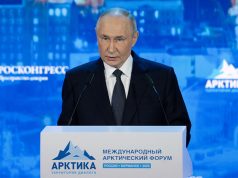
MOSCOW — Russia’s lower house of parliament on Wednesday approved a law that would give Moscow the power to force foreign media to brand the news they provide to Russians as the work of “foreign agents” and also to disclose where they get their funding.
The legislation needs approval from the upper house of parliament, which is likely to happen next week, and the signature of President Vladimir Putin before it becomes law.
In a sign that the authorities intend to enforce the law soon, a source in the Russian Justice Ministry said on Wednesday it had notified three U.S. news outlets they might be affected.
The source told Russian news agencies that Voice of America, a Russian unit of Radio Free Europe/Radio Liberty called Idel.Realias, and Current Time, produced by RFE/RL in cooperation with VoA, had all been notified.
Joanna Levison, a Prague-based spokeswoman for RFE/RL, said she was not aware of any such notification. VoA and the Justice Ministry did not immediately respond to requests for comment.
Russia’s broadside against U.S. media is part of the fallout from allegations that the Kremlin interfered in the U.S. presidential election last year in favor of Donald Trump.
U.S. intelligence officials accuse the Kremlin of using Russian media organizations it finances to influence U.S. voters, and this week Washington required Russian state broadcaster RT to register a U.S.-based affiliate company as a “foreign agent.”
The Kremlin denies meddling in the election and has said the restrictions on Russian broadcasters in the United States are an attack on free speech. It has vowed to retaliate by imposing restrictions on some foreign media operating in Russia.
In the 450-seat State Duma, 414 lawmakers voted on Wednesday for the new bill in a third and final reading, with none against, Russian news agencies reported.
If the upper chamber and Putin also back the draft, it will become law, but implementation of its provisions would be left to the discretion of the Russian government.
Putin has been fiercely critical of U.S. measures towards Russian media, but he has not given wholehearted support to the draft legislation, saying at the weekend it “might be a little too harsh.”
Branded as foreign agents
The draft legislation states that Russian authorities can designate foreign media as “foreign agents,” making them subject to the same requirements that are applied to foreign-funded non-governmental organizations under a 2012 law.
That law, heavily criticized by Western governments, was an attempt by Moscow to insulate itself from a wave of popular revolutions in eastern Europe and the Middle East. Moscow said they were fomented by Western governments using civil society groups as proxies.
Under the 2012 law, “foreign agents” have to include in any information they publish or broadcast to Russian audiences a mention of their “foreign agent” designation.
They also have to apply for inclusion in a government register, submit regular reports on their sources of funding, on their objectives, on how they spend their money, and who their managers are.
They can be subject to spot checks by the authorities to make sure they comply with the rules, according to the 2012 law.
RFE/RL’s Levison said she did not want to speculate what steps Russia might take against her organization next and said RFE/RL looked forward to continuing its journalistic work.
She said it was “inappropriate” to view the new Russian measures as being reciprocal since Russian-funded news outlets in the United States were still able to distribute freely.
“… RFE/RL has lost its broadcast affiliates in Russia due to administrative pressures, and has no access to cable. RFE/RL reporters are (also) subject to harassment and physical attack in Russia,” Levison added.








